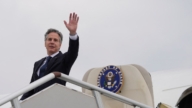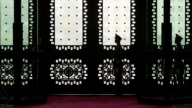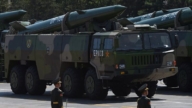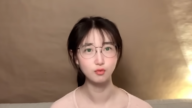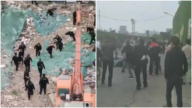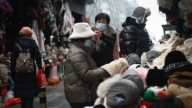【新唐人2013年06月07日訊】6月4號,中共廣電總局頒布了22條新規定,集中整治電視劇市場,首先對電視劇播出總量、範圍、題材、時機、時段等做出限定,規定還要求對電視劇開播前進行嚴厲的審查程序,同時限制古裝、涉案、引進、合拍等題材的電視劇。評論認為,這些規定主要是配合當局進行新一輪的洗腦,加強禁錮人民的思想,避免電視劇內容引起民眾的聯想。
這項名為《衛視綜合頻道電視劇播出調控管理辦法》的規定中,要求播出現實題材電視劇的總集數,要達到黃金時段集數的50%;古裝題材播出的總集數不能超過15%﹔涉案劇則根據內容進行劃分﹔引進劇和合拍劇,必須按發行許可證標註的時段播出。
新規定還要求,電視播出機構對所屬衛視播出的電視劇,進行播前審查和重播重審。總局對衛視黃金時段播出的電視劇,實行備案和抽查審看制度。省級播出機構需要將所屬黃金時段電視劇排播計劃上報,經審核無原則性問題,再按總局意見修改後安排播出。有原則問題的,不僅要換播,還要追究相關審查機構的責任。
北京時政觀察人士華頗分析認為,這22條規定,主要是配合當局進行新一輪的洗腦,加強禁錮國民的思想,當局怕一些電視劇播出來後引起民眾的聯想。
北京時政觀察人士華頗:「尤其黑龍江那場大火,使大家和一部古裝劇聯繫在一起,那就是『天下糧食』,是寫乾隆年間,貪官污史為了毀滅證據,就把天下官倉一把火燒掉了。所以黑龍江中儲糧大火點燃之後,尤其是中紀委巡視團剛入主中儲糧,這邊就發生這場特大的火災,所以輿論、人們思想一下和這部電視劇聯繫在一起。」
華頗指出,最近再加上東三省連續發生大火,造成嚴重人員傷亡,財產損失,華頗說,現在中共面臨危險的局面。
華頗:「而且又發生了前一陣子左派一系列向自由派的進攻,但是,左派實為進攻自由派,其實是對主流派、政派的進攻,其實是對著鄧小平的理論在叫板,可以說在中國的思想文化領域上,出現了嚴重的混亂,嚴重的分裂,所以它現在要加強掌控,它不能在衛視的這些電視節目上再出現嚴重問題。」
原《河北人民廣播電臺》編輯朱欣欣指出,中共當局這次對電視劇的整頓,跟中共的政治需要以及和當前的形勢有關。
原《河北人民廣播電臺》編輯朱欣欣:「一個是國內的情況,各地連續爆發一些群體事件,社會矛盾越來越尖銳,尤其是官民的衝突,再一個,除了領土的糾紛,還有經濟方面的一些衝突,在不斷的加劇。這樣,在內外交困的情況下,中共要嚴格的控制文藝,尤其是電視劇。」
朱欣欣指出,因為電視劇可以借古諷今,表達老百姓的聲音,和傳播一些西方民主自由等思想,令中共害怕,所以它鼓勵播出管控下的現實劇,限制古裝、合拍劇,甚至禁播引進劇等。
朱欣欣:「它還是想用利於中共的所謂紅色經典、或者有利於中共虛假的歷史進行美化、進行歌頌的電視劇,來佔領黃金時間,想利用這個對老百姓洗腦,說明老百姓的娛樂節目、古裝劇這些多了以後,就會削弱中共洗腦電視劇的宣傳,所以它要保證中共洗腦電視劇的播出。」
朱欣欣說,在中共獨裁專制下,老百姓想看一些娛樂節目的自由都沒有,一切和中共宣傳無關的,或不利它洗腦宣傳的,統統都要扼殺,說明中共越來越脆弱,也越來越恐懼。
而華頗表示,現在的媒體都是市場化運作,媒體想生存下去就要靈活的打一些擦邊球,所以他認為,這次中共當局對電視劇的整頓,注定不會成功。
採訪編輯/李韻 後製/蕭宇
China SARFT issued 22 new regulations to clamp down on the television market
On June 4, the China State Administration of Radio,
Film and Television (SARFT) issued 22 new regulations,
which concentrate on controlling the television market.
The regulations limit the volume, scope, subject matter,
and air time, and requires all TV series to pass through strict censorship.
In addition, dramas, criminal investigation shows, imported
TV series, and co-produced programs have been limited.
Commentators think these regulations have been issued
to support a new round of brainwashing by the Chinese Communist Party (CCP),
and are mainly used to imprison people』s minds
as well as to avoid people from associating TV show content with real-life current events.
The regulation, “Satellite Integrated Channel TV Sets
Broadcasting Regulations and Managing Approach,”
requires that the total quantity of reality shows must reach
50% of the total broadcasted shows during prime time,
and the quantity of costume drama shouldn’t be over 15%.
Crime investigation series should be divided by its content.
Imported and co-produced shows must be broadcasted
under the requirement marked on its publishing license.
The new regulation also requires each TV channel to include
a broadcast censor and re-broadcast censor in advance.
The SARFT will record and spot censor all TV shows
broadcasted during prime time.
The provincial channels must report the schedule
of their prime time broadcasting plan.
The SARFT will audit any problems and will then
oversee necessary modifications.
The show only can broadcast after receiving approval.
If any principle issues with the schedule are found,
the schedule must be changed, and the relevant review units must take responsibility.
Hua Po, a Beijing political observer, analyzed that these 22
regulations support a new round of brainwashing by authorities.
The authorities want to mentally imprison people,
and are worried that
some TV series may cause citizens to associate the
content with what’s taking place out in society.
Hua Po: “People particularly associated a drama entitled
‘World Food’ with the big fire in Heilongjiang province.
(The script) said that in the Qianlong period, corrupt officials
set fire to the official granary to destroy evidence.
The Heilongjiang case is the same.
Just after officials from the Central Discipline Inspection
Commission arrived at Sinograin, its granary caught on fire.
People associate the fire with the drama.”
Hua Po pointed out that recently, fires continue to burn
in the three Northeast provinces causing serious injuries,
deaths, and large-scale property loss.
Hua Po said that the CCP is facing a dangerous situation.
Hua Po: “In addition, the leftists launched
a series of attacks recently.
It looked like it was an attack on the liberals, but in fact
it’s an attack on the mainstream by the political factions.
We can say that in the ideological and cultural arenas,
China is serious disconnected on a mass scale now.
That’s the reason why the CCP wants to
strengthen its control.
It doesn’t want there to be a serious problem
with the satellite TV channels.”
Zhu Xinxin, the former editor of Hebei People’s Radio,
pointed out that
the reason why the CCP authority is purging TV shows is based
on their political needs and related to the current situation.
Zhu Xinxin: “On one hand, it’s the domestic situation.
There’re so many mass incidents all around China.
The social conflicts are increasingly acute,
especially conflicts between officials and people.
On the other hand, territorial disputes and economic
conflicts with other countries are constantly increasing.
Then, with this domestic and international trouble, the CCP
wants to strictly control culture and art, particularly TV.”
Zhu Xinxin pointed out that because TV shows can use
historical stories to satirize current events,
can express what’s on people’s minds, and can spread
democracy and open-mindedness, the CCP is scared.
So, it encourages the current dramas be made under control,
limits the costume and co-produced dramas and even bans imported TV series.
Zhu Xinxin: “The CCP wants to occupy prime time
with its classic red dramas or TV programs
which praise and glorify the CCP’s false history
in order to brainwash people.
After increasingly more entertainment programs and dramas
aired, the power of the CCP’s propaganda weakened.
That’s the reason why it wants to ensure broadcast
of its own brainwashing TV shows."
Zhu Xinxin said that under the CCP’s dictatorship, the people
don’t have the freedom to watch entertainment programs.
Anything that doesn’t relate to the CCP’s propaganda
or assist in its brainwashing effort is snuffed out by the CCP.
It shows out that CCP is increasingly weak
and more and more scared.
Hua Po said today’s media are market-oriented operations.
If a media outlet wants to survive in mainland China,
it must walk a fine line.
He thinks this consolidation of TV programming
is doomed to fail.



